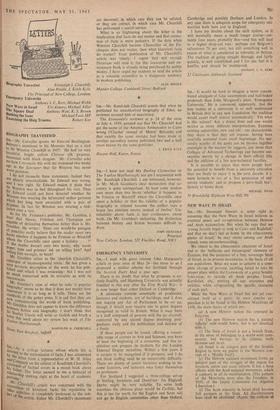d eyn , a college lecturer whose whole life is b y ',', e a
to the transmission of facts, I was astonished an the letter from a representative of W. H. Allen eataf-"IPanY on the subject of Randolph Churchill's ,,oeue of factual errors in a recent book about s"-e'ha ofiather. The letter seemed to me a betrayal of arshiP striking right at the heart of academic Puruits. corMtrer. Churchills article was concerned with the oth setneas of historical facts; his reputation in activities is completely irrelevant to the sub-
' of the article. Either Mr. Churchill's statements are incorrect, in which case they can be refuted, or they are correct, in which case Mr. Churchill has performed a useful service. What is so frightening about the letter is the implication that facts do not matter and that correc- tion of facts is mere pedantry. If the date when Winston Churchill became Chancellor of the .Ex- chequer does not matter, then what historical facts do matter? Your publication of Mr. Churchill's article was timely. I regret that not enough librarians will read it, for this inaccurate and un- necessary book is already being purchased by public money. I have urged my students to read the article as a valuable corrective to a dangerous tendency in modern publishing.


































 Previous page
Previous page